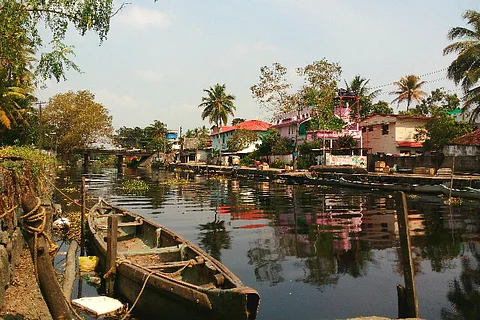

Water bodies play an inevitable role in the geographical richness of Kochi. Canals, lakes, backwaters and the sea make this natural harbour the ‘Queen of the Arabian Sea’.
18 canals flow across the city, touching almost all parts of Kochi. The elderly folks in the city recount stories of how they caught fish for lunch from these canals, by just stepping out of their homes. The canal water back then was unpolluted.
But now, you will see stagnant blackish water in almost all of them. Forget fishing, even walking through their banks is just not possible, due to the extremely foul smell emanating from them.
Results of a recent survey conducted by the Kochi SCMS Water Institute are disturbing, to say the least.
The survey conducted on the banks of city’s longest 10.58-kilometre long Thevara-Perandoor canal revealed that 632 pipes directly deposit toilet-waste into the canal.

“We do not have enough space to cater for a septic tank. Many of the households located here do the same. Kitchen waste too is also dumped here. Where would we throw the waste otherwise? If the authorities provide us an alternative, we shall comply,” remarks a resident who lives on the bank of the canal in Thevara, while speaking to The News Minute.
The study conducted by an 80-member team from the institute says that apart from septic waste, almost 216 drains carrying kitchen-waste, slaughter-waste and sewage lines too open into the canal.
This particular canal is directly linked to the Kochi Lake in Perandoor, thereby polluting the lake too.
Professor Sunny George -Director of SCMS Water Institute- says that this canal was once the agricultural lifeline of Kochi: “There were once fields on the banks of most of these canals, as their water was sufficient to sustain farming activities. The present condition can lead to a severe breakout of diseases among the local residents of the nearby areas.”
Kochi mayor Soumini Jain admits that other canals too face the same problem: “We have come to know that toilet-waste is being dumped into all 18 canals. The problem is indeed severe, as it creates serious health issues for the people living on its banks.”
There were also reports on how trucks carrying toilet-waste dump their contents into these canals, on the directions of agencies that take up cleaning of septic tanks.
Soumini however is quick to add that the Corporation has initiated measures for the ecological restoration of the 18-canal network which will be completed at the earliest.
“The SCMS survey was the primary step taken in this direction. They have submitted a detailed report, and we will soon implement the same,” she reiterates.
Last year, the Central Government had allotted Rs 23.58 crores under the Atal Mission for Rejuvenation and Urban Transformation (AMRUT) for the renewal of the canal, but no work has begun till date.

Other water sources in the city have also been affected.
The SCMS Water institute had prepared a water policy at the request of the City Corporation a year back, in which it was mentioned that 100% of well-water in Kochi is contaminated.
“Apart from that, 36% of ground-water in Kochi had e-coli bacteria, rendering it unsafe for use. The degradation of quality of ground-water over a period of time has risen to 67%, which just goes to show that it could worsen in the future,” warns Sunny.
This is mainly because of the extensive reach of the canals to almost all parts of the city, thereby contaminating even its ground-water.
Earlier, the Corporation had plans to start water-transport projects through these canals, so as to ease the heavy congestion of traffic on the Kochi roads. But the idea had to be later dropped, as the water was too polluted.
“Cleaning and rejuvenating Kochi’s water bodies can change the face of the city. Water transport is an excellent alternative to the severe traffic problems that Kochi faces,” opines environment activist Charles George.
As per the SCMS study, more than 50% of the households depend on Kerala Water Authority (KWA) for access to potable water. And since KWA does not supply water on a regular basis, acute shortage of water too exists.
“It is imperative to purify these water sources to tackle both water-scarcity and spread of contagious diseases. Especially when even the well-water is severely contaminated,” remarks Charles.